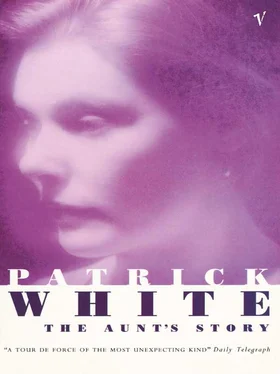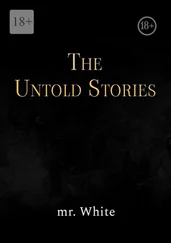About this time Fanny wrote to say it was going to happen at last. When I was so afraid, dear Theodora, Fanny wrote. But Fanny had made of fear a fussy trimming. Emotions as deep as fear could not exist in the Parrotts’ elegant country house, in spite of the fact that Mr Buchanan’s brains had once littered the floor. Fanny’s fear was seldom more than misgiving. If I were barren, Fanny had said. But there remained all the material advantages, blue velvet curtains in the boudoir, and kidneys in the silver chafing dish. Although her plump pout often protested, her predicament was not a frightening one. Then it happened at last. I am going to have a baby, Fanny said. She felt that perhaps she ought to cry, and she did. She relaxed, and thought with tenderness of the tyranny she would exercise.
‘I must take care of myself,’ she said. ‘Perhaps I shall send for Theodora, to help about the house.’
So Theodora went to Audley, into a wilderness of parquet and balustrades. There was very little privacy. Even in her wardrobe the contemptuous laughter of maids hung in the folds of her skirts.
‘God, Theodora is ugly,’ said Frank. ‘These days she certainly looks a fright.’
The servants knew, and took up his contempt. Miss Goodman, an old maid, they said, a scarecrow in a mushroom hat. She wore long shapeless dresses of striped voile, which made her look an oblong with a head and legs.
Fanny heard laughter, she heard Frank, but she did not speak, because she did not care enough, in her condition, in a boudoir cap. She looked at her fair plump face and wiped the sweat from a wrinkle with a pink puff. She made little grimaces for her figure, but only as a matter of course. Because her figure, like her self-importance, had momentarily swelled.
Sometimes Fanny talked to Theodora about My Baby.
‘You’ve no idea, Theo,’ she used to say. ‘It’s most solemn. As a sensation, I mean.’
‘I don’t doubt,’ said Theodora.
She pushed her needle through the flannel. She sat with her head bent, so that you could not see, and really, Fanny said, she sometimes wondered why she had sent for Theodora, she was less than human, she was no advantage at all.
Fanny Parrott finally had her child. It was a girl, whom they called Marie Louise.
‘Sounds fancy,’ Frank said, out of his slow, red face.
‘It’s most distinguished,’ Fanny replied.
Theodora took the baby outside, where the landscape was less pink, and the baby learned to stare at her with solemn eyes. The baby’s head trembled like a flower. It was reminiscent of the tender unprotected moments of her own retrospective awkwardness. So Theodora loved the child. Theodora became beautiful as stone, in her stone arms the gothic child.
‘She is sweet,’ said Fanny. ‘Ugly, of course. But sweet. Give her to me, Theo. My baby. My little sweet.’
And at once Theodora was ugly as stone, awkwardness in her empty hands. But the child swelled round and pink on the mother’s pink breast, and had all the banality of wax.
Before she had finished, Fanny Parrott had three children. They were her husband’s also, but his achievement was secondary. Fanny spoke about Your Father to her children, giving an official status, but scarcely raising an image of love. Fanny was safe now, she had children and possessions, she could dispense with love.
‘When you are good little children I am the happiest of women,’ she used to say, though it was doubtful who was taken in.
‘Is Aunt Theo happy?’ asked Lou.
‘Why ever not?’
‘Aunt Theo hasn’t any children,’ said Lou.
‘Aunt Theo,’ said George, ‘has a moustache. I felt it. It was soft.’
‘I forbid you to speak like that!’ said Fanny.
Sometimes she smacked her children for the truth.
‘You must respect your aunt,’ she said.
Respect became something written in a book for children to learn, just as Theodora Goodman became the Respected Aunt. She could make a dancer with a handkerchief. She could tell about Meroã. And, falling asleep, they raised their hands, but respectfully, to touch the moustache that was black and soft, and warm and kind as dogs.
She was the Respected Aunt. She was also the Respected Friend. All these years the lives of Theodora Goodman and Huntly Clarkson had not diverged, or only incidentally. They looked for and discovered in each other a respect that overcame aversion. Though often he was dubious. Theodora remained obscure. He could not read her. And she made him conscious of this illiteracy, amongst his other limitations.
If he experienced aversion it was because she broke the corners off his self-esteem, the most brittle of his valuable possessions, and continually failed to repair the damage. I shall subject myself to Theodora Goodman, he had said, but for some reason she refused to take command.
‘Theodora,’ he said, making a further effort, ‘we shall take the steamer.’
They took the steamer to where, under the pines, they ate big whiskered prawns, and the revolving horses flared their scarlet nostrils, and the figure in pink tights beat with her little hammer on the bell. Theodora was delighted with the merry-go-round, because she did not expect much. But Huntly Clarkson, who expected more, though what, trod the empty prawn shells into the sand and trodden grass and tried to ease his neck out of his collar.
Huntly was glad when the little steamer rushed them back through the green night, full of the rushing of the green water, that smelled of salt and oil. He sat with his hat in his lap and about his head a recklessness of cooling sweat. These are the moments, he felt, when the tongue can take command, without the assistance of drink, when the body is no longer ridiculous, when it is possible to talk of poetry, and God, and love, without belittling or destroying. He wanted to speak to Theodora. He wanted to admit his inadequacy, which, for once, had become almost a virtue, like a thick hawser trailing in a white wake.
Theodora began to sense, through the engine’s oily agony, that soon it would be said. The darkness was green and close and moist. She preferred, and she turned in her mind to, the wooden horses prancing in unequivocal sunlight.
‘I shall take you to dinner,’ Huntly said.
Because there remained his inadequacy. Whenever he failed, she noticed, his instinct was to give.
‘You have already given me lunch,’ she said.
The green light made her gentle. Words were blown out of the mouth, blurred, and tossed back towards the luminous wake of the ship. At such moments of obliteration I can almost accept the illusion, she felt.
‘You give me so much, Huntly,’ she said.
‘You are a most difficult woman, Theodora.’
‘To myself I am fatally simple,’ she said. ‘But let us talk instead about the prawns.’
Time slipped past them with the water. Huntly Clarkson was surprised to hear his voice, astonishingly level, legal, and unsurprised.
‘If I were to suggest marriage, Theodora,’ apparently he said.
It flew back in the wake of other lost phrases. And now it was unwise.
‘It would be a supreme act of kindness,’ she said. ‘Even for you.’
Rationalized, his gesture was a little feeble. Huntly Clarkson was not pleased. But Theodora Goodman was grateful. The farce had not screamed.
‘I am forty-three,’ she said.
‘It is not a question of age,’ he replied. ‘I am older.’
But it was not a question that he was able to explain.
‘I am ugly,’ she said. ‘I have never done things well.’
But Huntly Clarkson could not explain, least of all his own greater humility and discontent.
Theodora Goodman listened to the intense and varied activity of the sturdy steamer, and smiled for an incident that probably had not occurred.
Читать дальше












